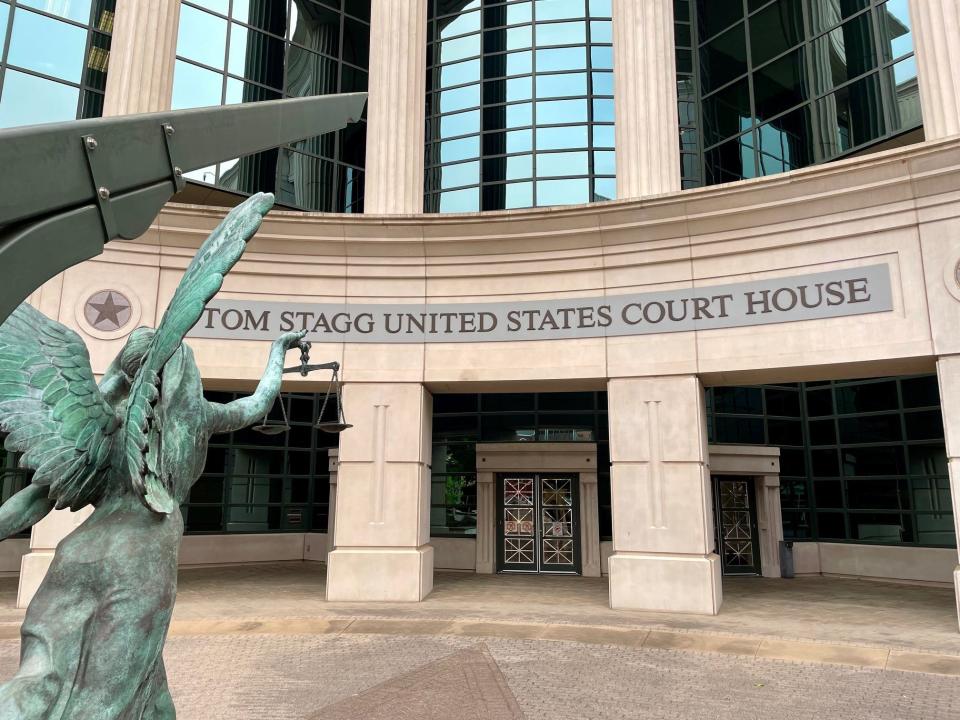Here's what we know about the latest status of Louisiana's elusive congressional map
- Oops!Something went wrong.Please try again later.
Three federal judges who threw out Louisiana's new congressional map asked the state's chief elections officer Monday for a hard deadline on the latest a map can be in place to conduct the Nov. 5 elections.
The three-judge panel issued a 2-1 decision last week ruling Louisiana's congressional map creating a second Black majority district was unconstitutional because of “an impermissible racial gerrymander,” siding with the plantiffs who sued to block the boundaries.
That left Louisiana without a congressional map and the state's U.S. House members and their voters in the dark on representation.
Monday's status conference wasn't conducted in open court. It was held virtually and only included the official parties in the case.
Louisiana Secretary of State Nancy Landry has previously said she needed clarity on a map by May 15 in order to conduct the fall congressional elections, but the judges asked her to respond by Friday with a hard deadline they believe can be extended.
A spokeman for Landry reitered her position Monday.
"That is indeed a hard deadline for us to implement the November map," Landry spokesman Joel Watson said in a statement to USA Today Network. "That's what we've been saying since this case began."
Attorney General Liz Murrill expressed frustration following Monday's status hearing.
"The secretary of state has consistently said May 15 is a hard, real deadline," Murrill said in a statement to USA Today Network. "Yet the panel seems inclined toward creating more chaos in our congressional elections in a presidential election year.
"While we will not have a definitive ruling for another day at least, we appear to be heading to the Supreme Court this week. My position has been clear: (The overturned map) is the current will of the Legislature and should be implemented. If that isn’t an option, for whatever reason, then (the map) from the 2022 session, which is what’s currently loaded in the system, should remain in place while this matter goes up to the Supreme Court.
"The Supreme Court needs to provide instructions to stare Legislatures so states are not on a perpetual federal litigation roller coaster over good faith efforts at redistricting. It’s confusing to voters, it’s expensive for taxpayers, and it’s inconsistent with the federal constitution."
The judges also asked the those representing the state and intervenors who defended the overturned map and the plaintiffs who successfully challenged it to be ready to present their own proposed maps moving forward, according to Jared Evans with the NAACP Defense Fund.
"They want to know whether May 15 is a must have or if there's wiggle room," said Evans, who attended the virtual hearing. "Obviously, the judges don't believe a new map can be in place by May 15."
USA Today Network is also seeking comment from Landry and Paul Hurd, one of the attorneys and plaintiffs who won the case after a three-day trial last month in Shreveport.
Evans said the judges gave little other direction other than establishing a deadline.

Evans said the judges did ask all parties - the state, intervenors and plaintiffs - to be prepared to submit one map, but they also specifically mentioned the possibility of having a neutral special master draw a new map.
Meanwhile, the NAACP Legal Defense Fund, a group of Black voters and other civic organizations have already filed a notice of appeal with the U.S. Supreme Court asking it to allow the rejected map to remain in place as an emergency remedy for the 2024 election until a new map can clear the courts.
At stake are the political careers of the incumbents and scope of representation for the state's Black voters.
The plaintiffs successfully challenged the map by attacking the new majority Black 6th Congressional District boundaries stretching from Baton Rouge to Lafayette to Alexandria to Shreveport as unconstitutional, arguing they they didn't meet traditional redistriction principles like compactness and preserving communities of interests.
The state contended additional factors drove the map, including the politics of protecting powerful incumbent Louisiana Republicans U.S. House Speaker Mike Johnson (4th District), Majority Leader Steve Scalise (1st District) and Julia Letlow (5th District), a member of the Appropriations Committee that controls the country's pursestrings.
Doing so put Republican U.S. Rep. Graves, the current 6th District congressman, in peril by dismantling his boundaries in favor of a majority Black voter population.
U.S. Western District Judges Robert Summerhays and David Joseph, both nominated by President Trump, sided with the plaintiffs. Fifth Circuit Court of Appeals Judge Carl Stewart, nominated by President Bill Clinton, dissented.
More: Election chaos in Louisiana as only state without a congressional map for fall ballot
Greg Hilburn covers state politics for the USA TODAY Network of Louisiana. Follow him on Twitter @GregHilburn1.
This article originally appeared on Shreveport Times: Here's the latest on Louisiana's congressional map court drama

